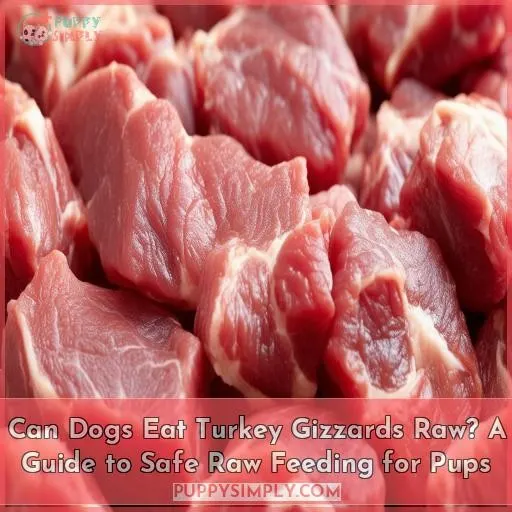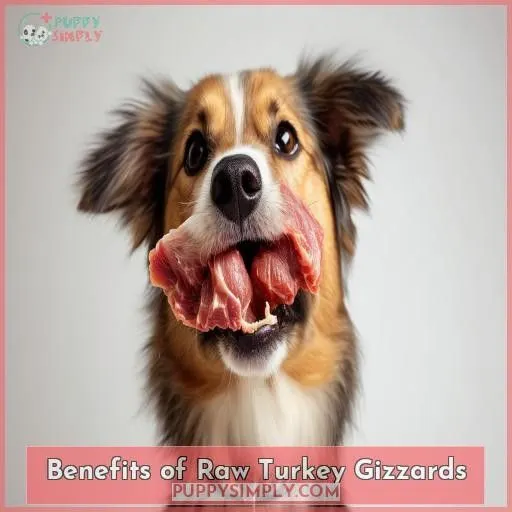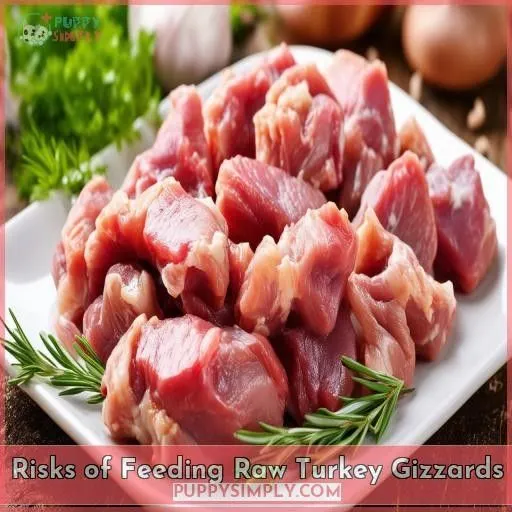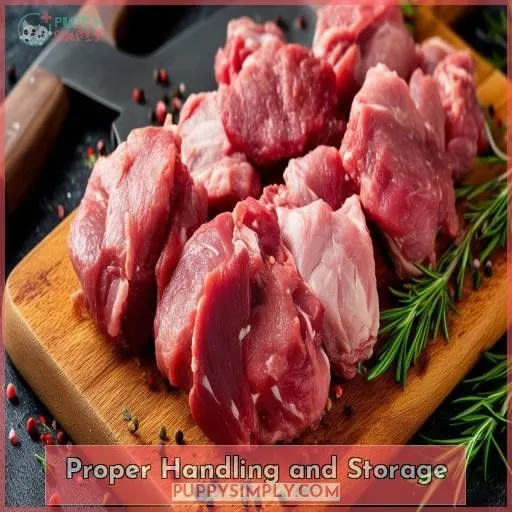This site is supported by our readers. We may earn a commission, at no cost to you, if you purchase through links.

Raw gizzards are nutrient powerhouses packed with protein, vitamins, and minerals. However, they may harbor harmful bacteria like Salmonella, Listeria, and E. coli, or even parasites.
Proper handling is essential – source from reputable suppliers, refrigerate promptly, and finely chop to prevent choking hazards.
While offering valuable enzymes and anti-inflammatory benefits, consider consulting your vet to ensure a balanced, age-appropriate raw diet.
Tread carefully, and you’ll release the nourishing potential of these offal treats for your pup’s palate.
Table Of Contents
Key Takeaways
- Raw turkey gizzards are little nutrient bombs – packed with protein, vitamins, minerals, and beneficial digestive enzymes that can do wonders for your pup’s health. But you’ve got to handle them with care, as these offal treats can harbor some nasty bacteria and pathogens that could make your furry friend (and you!) sick as a dog.
- Speaking of sick dogs, choking hazards are no joke when it comes to these tough little nuggets. You’ll want to chop or grind them up into bite-sized pieces, especially for smaller breeds or pups who like to inhale their food. Trust me, you don’t want to be performing the canine Heimlich at your next mealtime.
- Proper storage is key to keeping those gizzards fresh and safe. Refrigerate or freeze them promptly, and if you’re thawing them out, do it slowly in the fridge – no leaving them out on the counter to marinate in their own juices and potential bacteria growth. Food safety first, folks!
- As with any major dietary changes, it’s always a good idea to consult your vet before introducing raw gizzards to your pup’s menu. They can help you navigate any potential health concerns, ensure proper nutritional balance, and even offer tips on safe preparation methods. After all, a happy, healthy dog is the ultimate goal here.
Can Dogs Eat Turkey Gizzards Raw?
No, dogs shouldn’t eat turkey gizzards raw. Raw gizzards can contain harmful bacteria and parasites that can make your dog sick. While turkey gizzards can provide nutrients, it’s best to cook them thoroughly before feeding them to your pup to eliminate potential health risks.
Benefits of Raw Turkey Gizzards
Raw turkey gizzards are a nutrient-dense food packed with beneficial digestive enzymes and anti-inflammatory compounds that can offer valuable health benefits for dogs. When properly sourced and handled, feeding raw gizzards can introduce essential nutrients and promote digestive and immune system health in your canine companion.
Nutrient Dense
Turkey gizzards are a nutrient powerhouse, packed with high-quality protein, essential vitamins, and minerals. They’re an excellent source of bone marrow, a natural probiotic that aids digestion. Plus, gizzards contain glucosamine and chondroitin, which support joint health – a real bonus for active pups! With so many benefits, it’s no wonder raw feeders rave about this nutritious treat.
Digestive Enzymes
You’ll be delighted to know that turkey gizzards are also a fantastic source of digestive enzymes. These enzymes aid in breaking down proteins, ensuring excellent nutrient absorption from your pup’s food. By incorporating gizzards, you’re promoting digestive health and maximizing the utilization of every nutrient for your furry friend.
Anti-Inflammatory
You’ll love the anti-inflammatory properties of raw turkey gizzards! They:
- Reduce joint inflammation, promoting mobility
- Support immune function and cardiovascular health
- Improve skin and coat condition
With powerful anti-inflammatory compounds, gizzards offer a natural way to tackle inflammation and boost your pup’s overall wellbeing. Include them in their raw diet for ideal health benefits.
Risks of Feeding Raw Turkey Gizzards
While raw turkey gizzards can provide nutritional benefits, there are potential risks to account for. Feeding raw gizzards may expose your dog to harmful bacteria, parasites, and pathogens, as well as pose a choking hazard if not properly handled and prepared.
Potential Bacterial Contamination
You must be cautious, as raw turkey gizzards can harbor harmful bacteria like Salmonella, Listeria, Campylobacter, and E. coli. These contaminants may originate from unsanitary processing or improper handling. Proper refrigeration, cooking, and safe food prep are essential to mitigate bacterial risks and potential illnesses for your pup. Thoroughly washing surfaces and utensils is also recommended.
Parasites and Pathogens
You should also be cautious of zoonoses – diseases that spread from animals to humans – like trichinosis, salmonella, and campylobacter. Raw turkey gizzards can harbor parasites, bacteria, and other pathogens that could sicken you or your pup. Proper handling, cooking, and vet consultation are essential to minimize these risks.
Choking Hazards
Another risk is choking hazards. Whole gizzards can be a choking risk, especially for smaller breeds or puppies. To prevent choking, consider:
- Grinding or mincing gizzards
- Cooking to soften them
- Feeding smaller pieces
- Monitoring your dog while eating
Proper preparation and supervision are key to Safely incorporating gizzards into your pup’s raw diet.
Proper Handling and Storage
When feeding raw turkey gizzards to your dog, it’s paramount to source them from reputable suppliers that adhere to stringent food safety protocols. Proper refrigeration and freezing are also essential to prevent bacterial growth and maintain the freshness of the gizzards until you’re ready to thaw and prepare them for your pup’s meal.
Sourcing Fresh Gizzards
You’ll want to source fresh, high-quality turkey gizzards from reputable organic sources like local butchers or farm-to-table markets. Online retailers that specialize in raw pet food can also provide bulk ordering options for convenience.
| Source | Pros | Cons |
|---|---|---|
| Local Butcher | Fresh, transparent sourcing | Limited quantity |
| Farm-to-Table | Ethical, sustainable practices | Higher cost |
| Online Retailer | Bulk discounts, convenient | Quality concerns |
Prioritizing freshness and proper handling is essential for safe raw feeding.
Refrigeration and Freezing
Once you’ve sourced fresh turkey gizzards, proper storage is essential for food safety. Refrigerate them immediately and consume within 3-4 days or freeze for long-term storage. When freezing:
- Portion into meal-sized packs
- Remove as much air as possible
- Label with date and contents
- Store at 0°F (-18°C) or below
Frozen gizzards maintain quality for up to 6 months when properly packaged, preventing freezer burn and ensuring desirable freshness.
Thawing and Preparation
After properly refrigerating or freezing raw turkey gizzards, you’ll need to thaw them safely before serving. Allow sufficient thaw time in the fridge, never at room temperature. For preparation, finely chop the gizzards into bite-sized pieces for easier consumption and portion control. Exercise caution during handling to prevent cross-contamination or choking hazards.
Cooking Options for Turkey Gizzards
If you choose to cook turkey gizzards for your dog, boiling or simmering them is an excellent option that helps eliminate potential bacteria and parasites.
Alternatively, dehydrating or baking the gizzards at a safe temperature can create a crunchy, shelf-stable treat.
Adding cooked gizzards to your dog’s regular kibble or wet food is a convenient way to boost their nutritional intake.
Boiling or Simmering
One safe cooking method is boiling or simmering the gizzards. While this kills potential bacteria, it also reduces nutrients and enzymes. If your pup prefers softer textures, boil gizzards briefly to ease digestion time. Simmering longer retains more nutrients but yields a chewier texture. Consider your dog’s preferences when choosing cooking duration.
Dehydrating or Baking
Alternatively, you can dehydrate or bake turkey gizzards for a crunchy treat. Here are three methods to try:
- Dehydrate at 135°F for 10-12 hours until fully dried
- Bake at 200°F for 2-3 hours, flipping halfway
- Air fry at 350°F for 20-30 minutes until crispy
Whichever method you choose, monitor closely to prevent burning. Dehydration and baking kill bacteria, making gizzards safer for raw feeding.
Adding to Kibble or Wet Food
You can also mix cooked, dehydrated gizzards into your pup’s kibble or wet food. Monitor portion size and mixing ratios, gradually introducing gizzards to avoid digestive upset. While convenient, mixing can disrupt nutritional balance, so consult your vet about proper frequency and proportions to ensure your pup’s dietary needs are met.
Consulting a Veterinarian
You should consult your veterinarian to verify that raw turkey gizzards fit your dog’s specific nutritional needs and won’t pose any health risks based on factors like age, breed, and existing conditions. Your vet can provide guidance on properly balancing your pup’s diet with raw foods while monitoring for potential issues.
Nutritional Needs and Balancing Diet
You’ll want to discuss your pup’s nutritional needs with your vet before feeding raw turkey gizzards. A balanced diet is essential for:
- Proper growth and development
- Avoiding obesity or being underweight
- Identifying and managing food allergies
- Maintaining a healthy weight
- Providing complete nutrition
An expert can verify gizzards fit into your dog’s diet safely.
Potential Health Concerns
You’ll also want to discuss potential health concerns with your vet, like the risk of parasite transmission or bacterial growth from raw meat. Salmonella and E. coli contamination are real risks, so safe sourcing is necessary. Your vet can advise on mitigating these dangers while still providing raw nutrition.
Age and Breed Considerations
When consulting your vet about feeding raw gizzards, consider your pup’s age and breed. Puppies need more calories for growth, while seniors may require easier-to-digest foods. Large breeds may handle boney gizzards better than toy pups. Your vet will guide you on appropriate portions and any individual sensitivities based on your furry friend’s unique needs.
Frequently Asked Questions (FAQs)
How much turkey gizzard is safe to feed?
Imagine your pup eyeing that turkey gizzard – but go slow! One or two gizzards per week is plenty for most dogs. Too many can upset stomachs and pack on unhealthy pounds. Moderation’s key for a happy, healthy pup.
Can puppies eat raw turkey gizzards?
You shouldn’t give raw turkey gizzards to puppies. Their digestive systems are too delicate, increasing risks like bacterial infections or an obstructed bowel. It’s best to wait until your pup is fully grown before introducing raw meats.
Which dog breeds should avoid turkey gizzards?
You should avoid giving turkey gizzards to dogs with pancreatitis, as the high-fat content can exacerbate this condition. Smaller breeds may also struggle to digest them properly.
Can gizzards be a meal replacement?
Like a ship’s anchor, gizzards shouldn’t replace a dog’s balanced diet. These tough nuggets are treats – not meals. Make sure your pup gets their daily nutrient requirements from high-quality kibble or homecooked eats; gizzards are tasty side dishes, nothing more.
How often can dogs eat turkey gizzards?
You can feed turkey gizzards occasionally as treats, but shouldn’t make them a staple diet. Too many can lead to dietary imbalances. Moderation is key for your pup’s health.
Conclusion
Raw turkey gizzards present a piquant protein source for pups.
But proceed cautiously to guarantee safe indulgence.
Be judicious in sourcing and preparing these nutrient-dense offal treats.
Ultimately, consulting your veterinarian provides the surest guidance on whether your canine can eat turkey gizzards raw within a balanced, species-appropriate diet.
With due diligence, these delicacies may nourish both body and taste buds alike.











